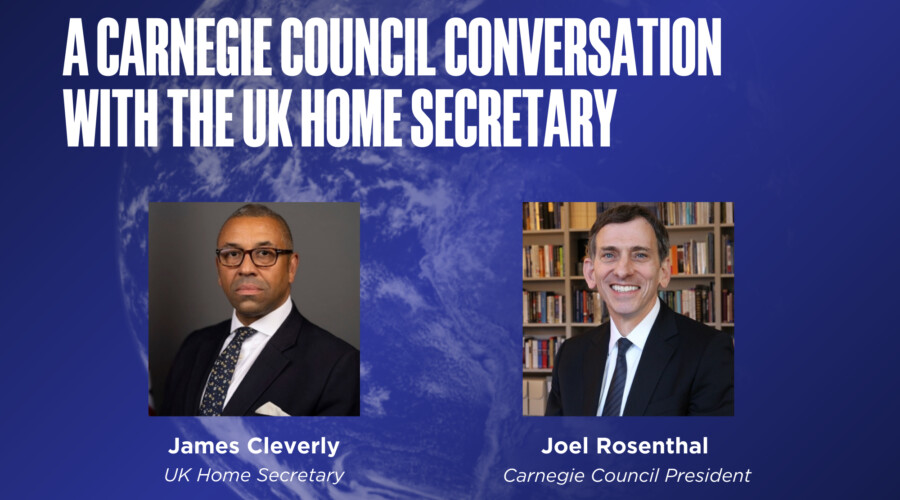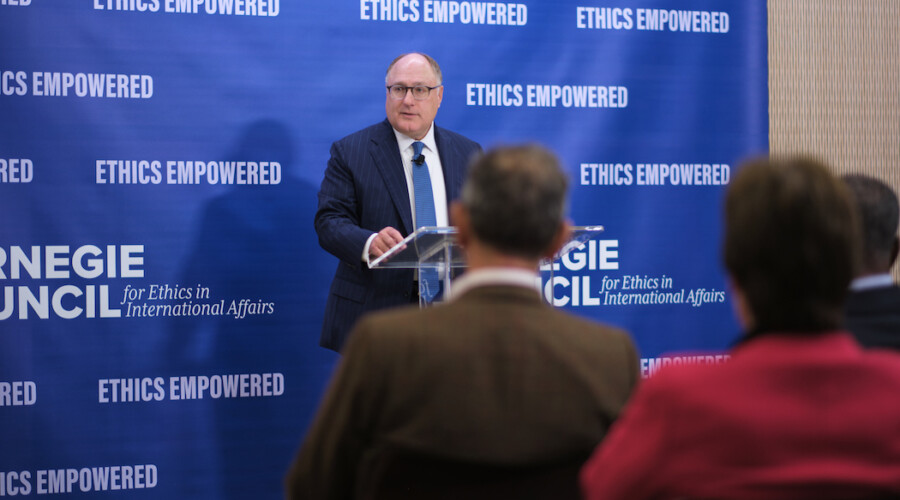Sandhya Bhat and Catherine Pushpam Joseph are both 19 years old and are both second-year B.S.L. LLB. students at the Indian Law Society's Law College in Pune, India.
Essay Topic: In your opinion, what is the greatest ethical challenge or dilemma facing the planet?
Human Trafficking
We live in a world that has accepted man's absolute control over another. The unjustified trade and enslavement of human beings in the 21st century reflects a degenerate state of affairs which confirms that the greatest ethical challenge facing the globe today is human trafficking. Human trafficking involves the use of human deception to exploit the vulnerable through forceful stripping of their dignity and self-worth. It portrays a contrasting picture of inequality among equals with regard to the right of every individual over his or her life, as trafficked victims are compelled to sell their inherent freedom and are subject to coercive subjugation. Their cry for help is drowned in the sea of constant oppression and general sense of apathy which has been continuing for centuries.
Human trafficking is a global phenomenon that manifests in the form of sex trafficking, bonded labor, and organ trafficking. Poverty lies at the heart of human trafficking. In sex trafficking, women and children are merely reduced to the status of a gratifying sexual commodity. It has become an organized billion dollar industry and has at its core, investors, unscrupulous recruiters and corrupt public officials as principal participants. Globalisation has given birth to a service industry entirely dedicated to providing transportation, forged documents, legal, financial and accounting assistance. Prostitution in Kamathipura, India’s largest red-light district, generates $400 million with 100,000 prostitutes who have been kidnapped and trafficked from India's rural areas.
Exploiters take advantage of the broken environment of victims and lure them with false promises of a better life. During the trafficking process, victims are subjected to 'grooming' through constant physical and sexual abuse in order to force them to submit. Blind faith leads victims to the pit of darkness as caution is compromised because of desperation. Cops sometimes conspire with traffickers in return for free sexual favors. This hypocrisy among the upholders of justice deters victims from seeking assistance.
Sometimes parents, desperate to repay their debts, sell their girls to brothel owners in return for a paltry sum. This is particularly seen in the 'Dalit' or untouchable community in India. In Belize, school-aged minors are forced by their own parents to provide sexual favors to wealthy older men called sugar-daddies, in exchange for school fees. Daughters in Afghanistan are sold as brides to repay the opium debts of their fathers. As the world progresses, often the gift of parenthood is sold out.
The most brutal form of sex trafficking is the commercial exploitation of children. Sadists feed on the popular belief that having sex with a virgin would cure them of sexually transmitted diseases. Little girls are raped and tortured to such an extent thattheir reproductive system is permanently damaged depriving them of their natural right to motherhood. The incidents of sexual exploitation among young boys are seldom heard of because of the complete failure on our part to acknowledge its existence which is further fuelled by the gender-biased assumption that there can never be male victims. The practice of bachcabaazi in Afghanistan and laundanach in India, where boys dress up as girls and entertain men, provides an insight into the world of male sex slavery and prostitution.
Under the guise of religion, the medieval Devadasi system is still prevalent in India where young girls are trafficked and married off to a 'temple deity.' They are then forced to provide sexual services to priests and higher caste 'devotees' with no hopes of a real marriage. The double standards of people are despicable. Men who degrade the lower caste Dalits don't hesitate to have sex with their women. Traumatized and ashamed by this way of life, these women eventually forsake their name and identity.
Failure to reintegrate victims of sex trafficking in society is partly due to the social stigma attached to their previous lifestyle. Those victims who are rescued are often ostracized by the mainstream society. Standing on pedestals, created by our own self-righteous minds, we judge trafficked sex-workers with disgust and contempt, as we fail to realize that most of them were sold into the flesh trade by their families and friends. This social isolation is one of the reasons that drive victims back into the flesh trade. Another damaging aspect of human trafficking is the transformation of female victims into exploitive traffickers themselves as their conscience is marred by the luxuries provided by instant cash. It is imperative to realize that prostitutes are not criminals, but victims of the society that has allowed prostitution.
The unjust, age-old practice of bonded labor, where labor is provided as a means of repayment of loan with very little or no pay, is predominantly prevalent in developing countries. Descent and caste-based discrimination, poverty, illiteracy and lack of government welfare schemes lie at the heart of this contemporary form of slavery. A kind of descent-based slavery exists in Nigeria where women and young girls are sold as unofficial wives known as wahaya and subject to domestic and sexual slavery.
In India, bonded labour is justified on the grounds of caste system, i.e. the belief that not all men are born equal and some are always meant to be at the mercy of another. What saddens us is the reluctance on the part of our government to acknowledge the large-scale existence of this practice. Many, including public officials, hold the prejudiced view that this is a social phenomenon exclusive to villages, and can be overlooked despite a legislation that abolishes this system. The textile mills in Tamil Nadu, a southern state of India, mask a modern kind of slavery in the form of Sumangali scheme, whereby daughters of low caste families unknowingly fall prey to bondage in return for a wedding advance. As the journey towards wedding bliss turns out to be a torturous one, one cannot help but marvel at how exploiters have left no stone unturned in their mission to take advantage of the needy. The condition of domestic servants, including children, is horrible, as they are made to work for hours, with minimal food and routinely subject to physical abuse. Foreign domestic workers, especially in the Middle East, are constantly intimidated by powerful brokers and face severe legal and financial hurdles if they dare to escape from their employers.
One of the ugliest manifestations of debt bondage is forced child labor seen in mining, beedi, silk, and carpet industries of India and as camel jockeys in United Arab Emirate [UAE] countries. Children are gullible and can be easily threatened or manipulated. They are forced to take up their parents' responsibility of repayment of debt and are unfairly denied education during their nurturing years. In war torn countries, children are abducted and made to join militias. These child soldiers are robbed of their childhood, are transformed into savage animals, and are brainwashed into believing killing is right.
Organ trafficking is a relatively new misdemeanor which has plagued the world. Demand for human organs far exceeds the supply resulting in surfacing of conniving middlemen or agents who scheme with unscrupulous medical professionals to cheat the poor. These people are unaware of the medical consequences of organ donation and give their consent out of desperate need for money.
Human trafficking is more or less a structured industry with both demand and supply sides. Restricting demand, i.e. those financing such illegal operations, will help in curbing human trafficking. Countries can collaborate to form a uniform database for information on human trafficking. Embassies should become victim friendly. Security at international borders should be tightened to counter transnational trafficking. Training sessions should be provided to law enforcement agencies in handling rescue operations and dealing with victims of sex trafficking.
Lack of political will to immediately address the root causes of human trafficking has lead to its expansion. Governments must realize that every individual has the right to life, which includes right to food, education and employment and therefore must make provisions for the same. In India and other developing countries, to combat slavery, it is crucial to have a deep understanding of the financial, political and cultural power structures in society. States can set up commissions, along with NGOs, to conduct comprehensive surveys and identify people involved in all forms of human trafficking. This will help in the rescue and rehabilitation processes.
Every person can contribute towards this cause by being vigilant in his locality and reporting suspicious activities to authorities on hotline numbers.Only when we started researching did we realize the absolute seriousness of this problem. It is necessary to create awareness among students through seminars and workshops.
There is no doubt we live in a world that specializes in creating broken people every day. We've reached a point where eradicating human trafficking is no longer restricted to few willing individuals and organizations. Anyone, in any manner, can help in minimizing this condemnable condition. It just comes down to whether we are willing to take that first step.



